In most cases, asking someone if their next step might be in the direction of President of the EU Commission, President of the EU Parliament or President of Ireland might seem fanciful – but not when that person is Mairead McGuinness, for Mairead has been a contender for all those roles over the course of her career.
But – ever the politician – she deflects the question, citing instead, perhaps a course in horticulture, politics, history and English might be next.
Or maybe, she says, “I’ll have done enough and will plant more trees. Given COVID, it is wise not to have fixed plans.”
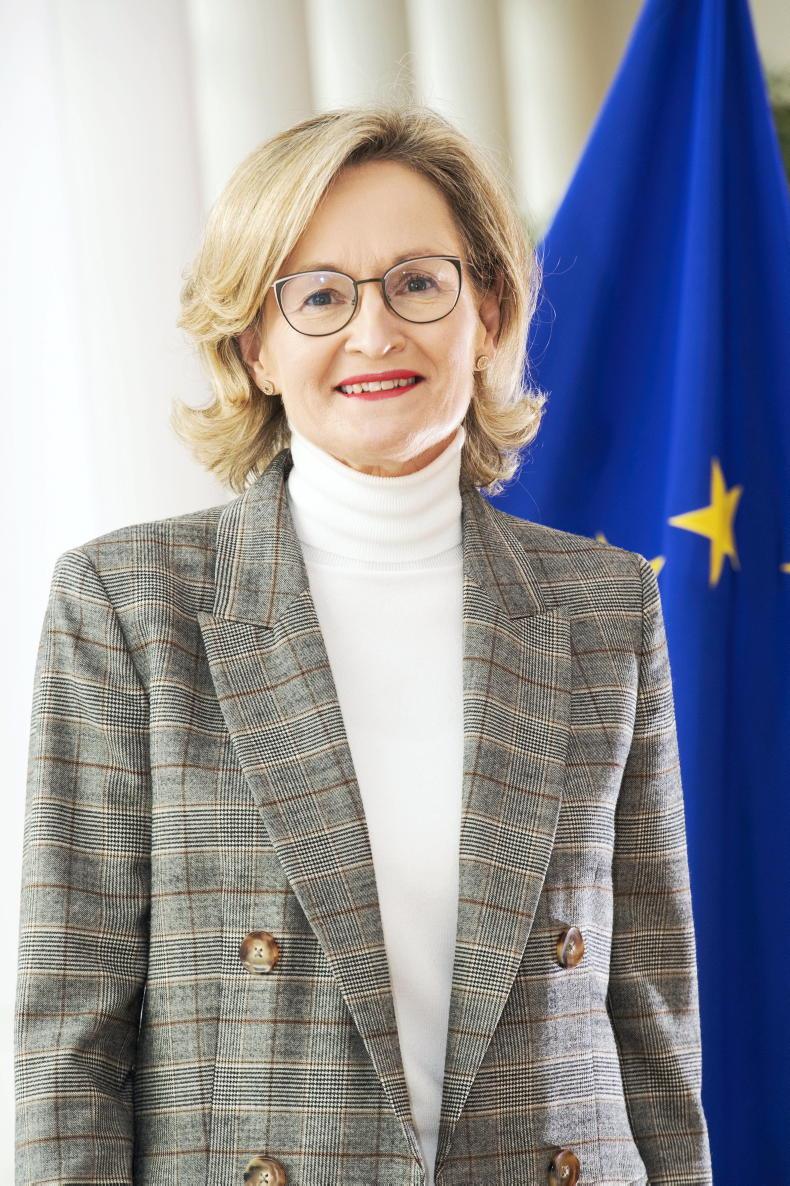
Mairead McGuinness has served as the European Commissioner for Financial Stability, Financial Services and the Capital Markets Union since October 2020.
\ EC - Audiovisual Service/Lukasz Kobus.
One year ago, Ireland had not yet experienced a COVID-19 lockdown and our EU Commissioner was a tall man from Kilkenny. Mairead McGuinness, who was at that time First Vice-President of the European Parliament, was riding high in the national psyche. When she turned off the mic of Brexit party leader, Nigel Farage, mid-sentence for disobeying parliament rules, most of Europe gave the Louth lady a virtual fist pump.
Fast forward a year and the now-Commissioner for Financial Stability, Financial Services and the Capital Markets Union can assert without question that: “We are not really the masters of our own destiny. So better to go with the flow and be prepared for rough sailings.”
Role of a commissioner
When put to her that losing the trade portfolio was a blow for Ireland, she is clear as to the mandate of commissioners.
“EU commissioners have a duty to act in the EU interest and not just the interest of the member state they come from.”

Mairead McGuinness is Commissioner for Financial Stability, Financial Services and the Capital Markets Union. \ EC - Audiovisual Service/Lukasz Kobus.
The undertone here, of course, is that Phil Hogan was not the trade commissioner for Ireland, no more than Mairead McGuinness is the finance commissioner for Ireland.
Speaking of her new role, Mairead says: “We notice financial services more when they are not working well and their impact is then clear on every part of the economy. Light touch regulation in the past resulted in the financial crisis, which has left difficult legacy issues.”
However these crises, she points out, resulted in tougher regulation on financial institutions. This, she says, has meant “banks were better able to assist in the COVID-19 crisis by continuing to provide money to businesses and households.”
COVID-19 and money
Mairead believes that the pandemic has been a real “wake-up call”.
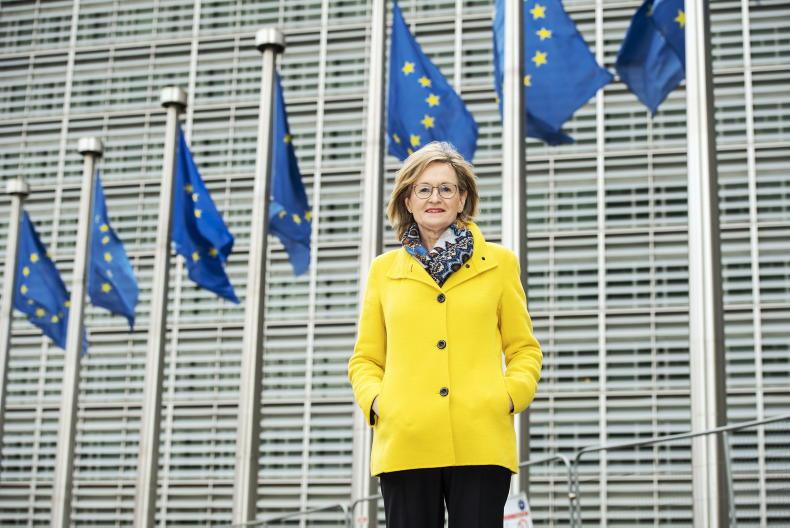
Commissioner Mairead McGuinness outside the Berlaymont building, the headquarters of the European Commission in Brussels.
“The European Central Bank (ECB) has engaged in bond buying and supplying liquidity to the marketplace,” she says. “The EU took an early decision to lift the debt and other restrictions – including state aid rules – to allow member states to respond with support measures.” This, she sees continuing into the foreseeable future.
“Strong collective action has been taken by the EU to support the economic recovery,” she continues.
“The Next Generation EU (NGEU) programme will provide €750bn for investments and reforms. This money should be used, particularly to support the green and digital transitions.”
Sustainable finance
Speaking of the Farm to Fork Strategy and how it proposes to change EU farming, Irish Country Living queries the lady who now holds the cheque book: how exactly will this be paid for?
“The EU has indicated that ‘sustainable finance’ will be made available, and this means investing money to address the objectives of our climate and environmental targets, as well as social and governance issues,” Mairead explains.
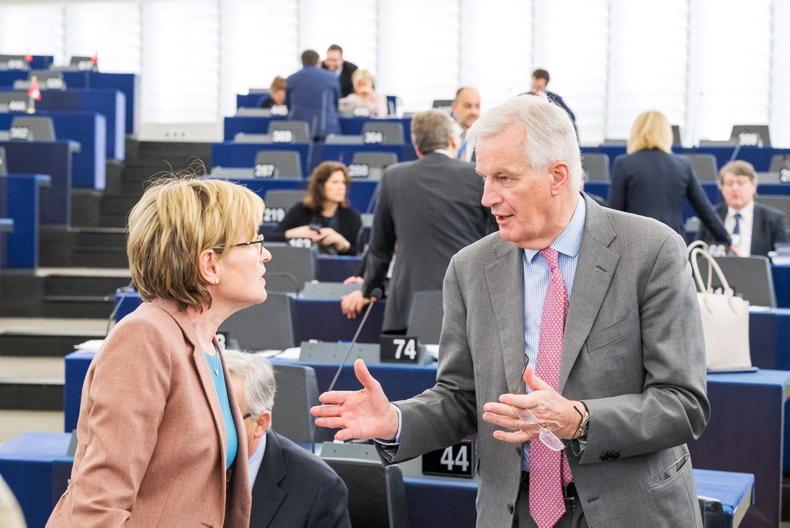
Mairead McGuinness MEP and Vice-President of the European Parliament is pictured with the EU's Chief Brexit Negotiator Michel Barnier in the European Parliament, Strasbourg.
“The EU has set very ambitious targets for climate neutrality by 2050, including an interim target of at least a 55% reduction in emissions by 2030.”
Climate neutrality targets have been agreed, but she says “although the destination is clear; the path less so. To turn words into action requires finance.
“Some companies are labelling their activities as ‘green’ but may not actually have a significant positive impact on the environment. 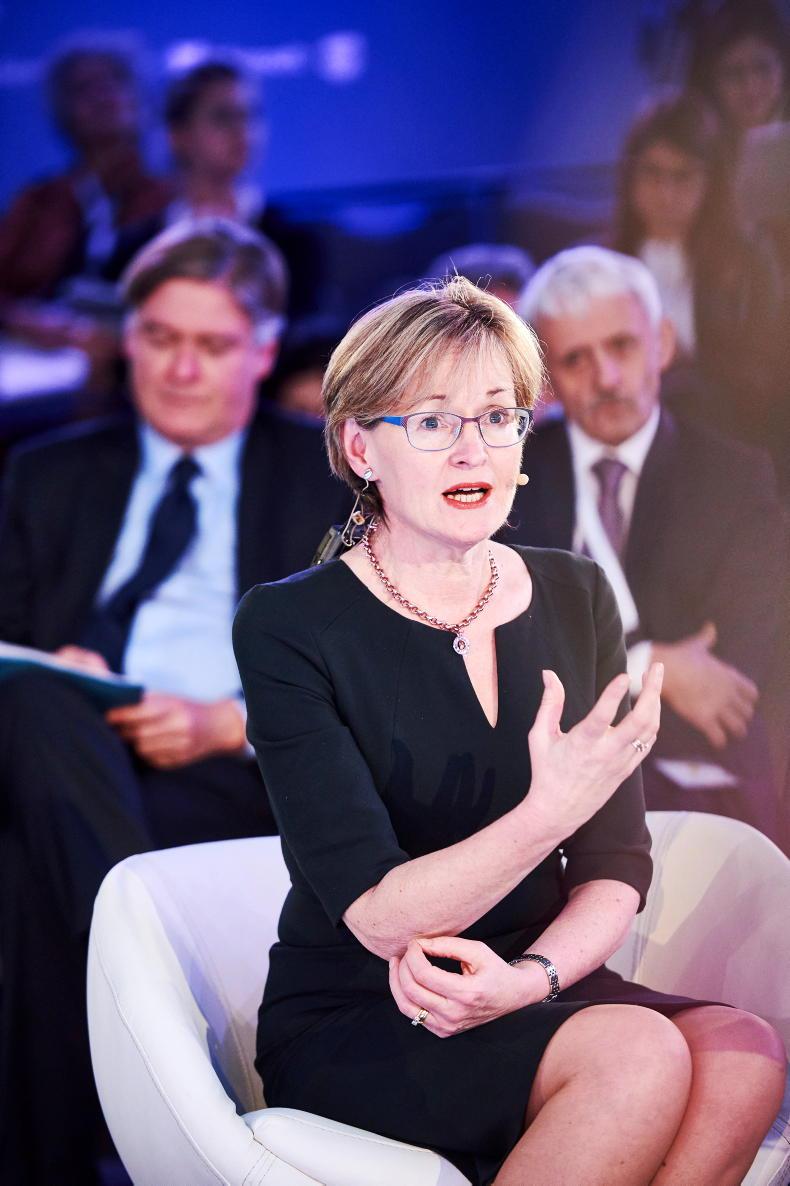
Investors are calling for clarity on what is really green to avoid so-called ‘green washing’. The European Parliament and the Council have agreed a taxonomy on sustainable activities. It defines, for example, sustainable land use, energy and waste management. It is a work in progress and will evolve over time.”
When challenged on the lack of an economic analysis on the Farm to Fork, Mairead alludes to the positives of the plan.
“There is a lot that is positive in the strategies, which would enhance the sustainability and resilience of farms,” she says. “Ideas to enhance nature and habitats on farms are positive, as are efforts to reduce input use and to promote healthy soils. We have already seen where a reduction in fertiliser use has been possible, with no reduction in yield.”
Support for farmers
On the USDA report, which evaluated the economic impact of the Farm to Fork, she cautions: “Reports can often be used to reinforce our own opinions, rather than to inform them.” Irish Country Living argues that with farm incomes already poor, there is no room for any fall in incomes.” And as a farmer herself, Mairead is aware that some of the parameters of the Farm to Fork will be difficult for Ireland to achieve.
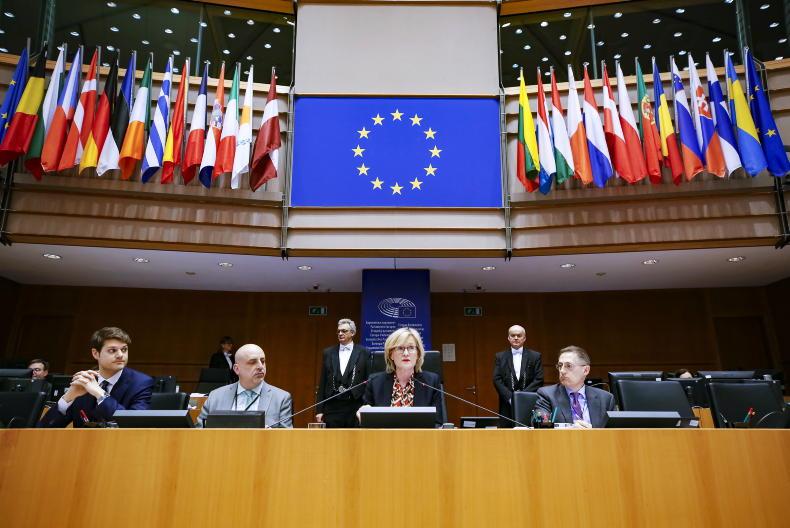
\ ©European Union
“The target for organic production is high, in the Irish context, and we do need an assessment of the feasibility of achieving this target,” she admits.
“Many farmers are already doing more for nature in how they farm and, with the right incentives, want to do more. The way the CAP is implemented in deducting an area under a habitat from the calculation of the payment is perverse and actively discourages the very thing that the EU is trying to promote. I have repeated this point on a number of occasions and it needs to be addressed in the CAP reforms under discussion.”
Relationship with Europe
Mairead was notably critical of the EU for threatening to use Article 16 of the Northern Ireland protocol.
“It was acknowledged and rectified,” she says. “The EU has invested both time and financial support in the Peace Process. It saddens me that the credentials of the EU when it comes to Northern Ireland are being judged harshly by this one – albeit serious – mistake, which was rectified.
“We should constantly remind ourselves that the Protocol is an attempt to fix a problem created by Brexit. It is Brexit that has reintroduced a long-forgotten idea of borders and barriers. The EU broke down borders and barriers. Brexit is recreating them.”
On gender discrimination
With International Women’s Day just around the corner, Irish Country Living asks Mairead for her thoughts on gender mainstreaming and Von der Leyen requesting both a male and female nominee for the Irish Commissioner replacement.
“The president said she wanted two names; a woman and a man,” she says. “Interesting that she was reported as having said ‘a man and a woman’ – that speaks a lot to the reality of women’s lives and experiences.
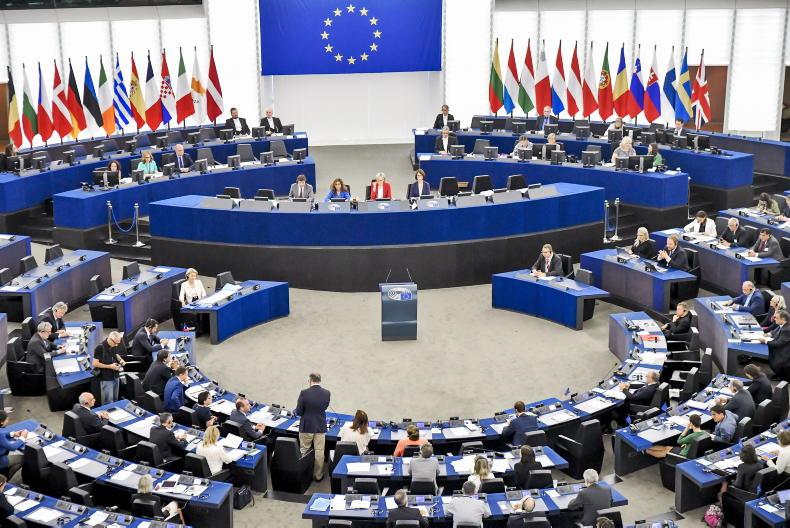
\ ©European Union
“She made a commitment to the European Parliament to strive for a gender-balanced Commission and she has achieved that. When I was 17, I didn’t see the need for gender mainstreaming; believing that women would succeed on merit. I’m now 61 and know that has not been the reality. Without proactive policies in place, the gender issue will not be addressed.”
Mairead worked in agriculture for many years and was always cognisant of how few women attended farmers’ meetings. She notes: “Those who attended did not always feel comfortable contributing.”
But she also says: “That is changing. It has been noticeable that these [female] farmers are now more visible. We are facing decades of unprecedented change and we need women and men to lead and contribute to that change.”
Women and finance
Women remain underrepresented when it comes to investment; both as beneficiaries of investment and as decision makers.
“Much remains to be done to increase the number of women in decision-making in finance,” Mairead says. “But I believe we can make progress, and as the first woman to hold the finance portfolio in the Commission, it is an issue I intend to be very active on.
“There are currently a number of women in senior finance and economic roles in the EU and worldwide,” she continues. “Christine Lagarde in the European Central Bank (ECB), Dr Elke König in the Single Resolution Board (SRB), Janet Yellen, US Secretary of the Treasury, and Kristalina Georgieva, head of the International Monetary Fund (IMF). We notice these women because they are the exception to the unwritten rule.
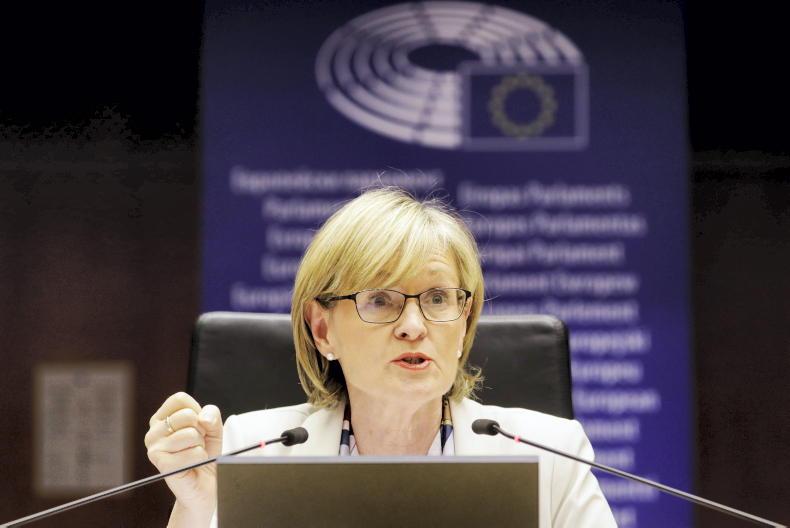
Mairead McGuinness \ Thierry ROGE EP
“Financial literacy and financial education are issues I want to prioritise,” she says. “These are life tools; essential to helping us make informed choices about our finances, and are particularly important for financially vulnerable households.”
Missing home
Mairead says, as with nearly everyone else in the world, the COVID-19 pandemic has affected her family life.
“I don’t travel home every weekend from Brussels,” she says. “I spend a lot of time on my own, especially over weekends, but I’ve adjusted to that. I do miss being at home, especially as lambing starts and spring unfolds, but I look forward to better days ahead.”
The last line is for Tom, Mairead’s husband, whom she credits as the most important support for her career.
“He is solid and steady, hugely supportive, and when things are tough, he encourages me to be tough. Apparently, that comes from playing football – he’s a Meath man.”
Read more
Representation for all
‘We were kind of like ships in the night’
Eating for the body versus eating for the planet – are they one and the same?
In most cases, asking someone if their next step might be in the direction of President of the EU Commission, President of the EU Parliament or President of Ireland might seem fanciful – but not when that person is Mairead McGuinness, for Mairead has been a contender for all those roles over the course of her career.
But – ever the politician – she deflects the question, citing instead, perhaps a course in horticulture, politics, history and English might be next.
Or maybe, she says, “I’ll have done enough and will plant more trees. Given COVID, it is wise not to have fixed plans.”

Mairead McGuinness has served as the European Commissioner for Financial Stability, Financial Services and the Capital Markets Union since October 2020.
\ EC - Audiovisual Service/Lukasz Kobus.
One year ago, Ireland had not yet experienced a COVID-19 lockdown and our EU Commissioner was a tall man from Kilkenny. Mairead McGuinness, who was at that time First Vice-President of the European Parliament, was riding high in the national psyche. When she turned off the mic of Brexit party leader, Nigel Farage, mid-sentence for disobeying parliament rules, most of Europe gave the Louth lady a virtual fist pump.
Fast forward a year and the now-Commissioner for Financial Stability, Financial Services and the Capital Markets Union can assert without question that: “We are not really the masters of our own destiny. So better to go with the flow and be prepared for rough sailings.”
Role of a commissioner
When put to her that losing the trade portfolio was a blow for Ireland, she is clear as to the mandate of commissioners.
“EU commissioners have a duty to act in the EU interest and not just the interest of the member state they come from.”

Mairead McGuinness is Commissioner for Financial Stability, Financial Services and the Capital Markets Union. \ EC - Audiovisual Service/Lukasz Kobus.
The undertone here, of course, is that Phil Hogan was not the trade commissioner for Ireland, no more than Mairead McGuinness is the finance commissioner for Ireland.
Speaking of her new role, Mairead says: “We notice financial services more when they are not working well and their impact is then clear on every part of the economy. Light touch regulation in the past resulted in the financial crisis, which has left difficult legacy issues.”
However these crises, she points out, resulted in tougher regulation on financial institutions. This, she says, has meant “banks were better able to assist in the COVID-19 crisis by continuing to provide money to businesses and households.”
COVID-19 and money
Mairead believes that the pandemic has been a real “wake-up call”.

Commissioner Mairead McGuinness outside the Berlaymont building, the headquarters of the European Commission in Brussels.
“The European Central Bank (ECB) has engaged in bond buying and supplying liquidity to the marketplace,” she says. “The EU took an early decision to lift the debt and other restrictions – including state aid rules – to allow member states to respond with support measures.” This, she sees continuing into the foreseeable future.
“Strong collective action has been taken by the EU to support the economic recovery,” she continues.
“The Next Generation EU (NGEU) programme will provide €750bn for investments and reforms. This money should be used, particularly to support the green and digital transitions.”
Sustainable finance
Speaking of the Farm to Fork Strategy and how it proposes to change EU farming, Irish Country Living queries the lady who now holds the cheque book: how exactly will this be paid for?
“The EU has indicated that ‘sustainable finance’ will be made available, and this means investing money to address the objectives of our climate and environmental targets, as well as social and governance issues,” Mairead explains.

Mairead McGuinness MEP and Vice-President of the European Parliament is pictured with the EU's Chief Brexit Negotiator Michel Barnier in the European Parliament, Strasbourg.
“The EU has set very ambitious targets for climate neutrality by 2050, including an interim target of at least a 55% reduction in emissions by 2030.”
Climate neutrality targets have been agreed, but she says “although the destination is clear; the path less so. To turn words into action requires finance.
“Some companies are labelling their activities as ‘green’ but may not actually have a significant positive impact on the environment. 
Investors are calling for clarity on what is really green to avoid so-called ‘green washing’. The European Parliament and the Council have agreed a taxonomy on sustainable activities. It defines, for example, sustainable land use, energy and waste management. It is a work in progress and will evolve over time.”
When challenged on the lack of an economic analysis on the Farm to Fork, Mairead alludes to the positives of the plan.
“There is a lot that is positive in the strategies, which would enhance the sustainability and resilience of farms,” she says. “Ideas to enhance nature and habitats on farms are positive, as are efforts to reduce input use and to promote healthy soils. We have already seen where a reduction in fertiliser use has been possible, with no reduction in yield.”
Support for farmers
On the USDA report, which evaluated the economic impact of the Farm to Fork, she cautions: “Reports can often be used to reinforce our own opinions, rather than to inform them.” Irish Country Living argues that with farm incomes already poor, there is no room for any fall in incomes.” And as a farmer herself, Mairead is aware that some of the parameters of the Farm to Fork will be difficult for Ireland to achieve.

\ ©European Union
“The target for organic production is high, in the Irish context, and we do need an assessment of the feasibility of achieving this target,” she admits.
“Many farmers are already doing more for nature in how they farm and, with the right incentives, want to do more. The way the CAP is implemented in deducting an area under a habitat from the calculation of the payment is perverse and actively discourages the very thing that the EU is trying to promote. I have repeated this point on a number of occasions and it needs to be addressed in the CAP reforms under discussion.”
Relationship with Europe
Mairead was notably critical of the EU for threatening to use Article 16 of the Northern Ireland protocol.
“It was acknowledged and rectified,” she says. “The EU has invested both time and financial support in the Peace Process. It saddens me that the credentials of the EU when it comes to Northern Ireland are being judged harshly by this one – albeit serious – mistake, which was rectified.
“We should constantly remind ourselves that the Protocol is an attempt to fix a problem created by Brexit. It is Brexit that has reintroduced a long-forgotten idea of borders and barriers. The EU broke down borders and barriers. Brexit is recreating them.”
On gender discrimination
With International Women’s Day just around the corner, Irish Country Living asks Mairead for her thoughts on gender mainstreaming and Von der Leyen requesting both a male and female nominee for the Irish Commissioner replacement.
“The president said she wanted two names; a woman and a man,” she says. “Interesting that she was reported as having said ‘a man and a woman’ – that speaks a lot to the reality of women’s lives and experiences.

\ ©European Union
“She made a commitment to the European Parliament to strive for a gender-balanced Commission and she has achieved that. When I was 17, I didn’t see the need for gender mainstreaming; believing that women would succeed on merit. I’m now 61 and know that has not been the reality. Without proactive policies in place, the gender issue will not be addressed.”
Mairead worked in agriculture for many years and was always cognisant of how few women attended farmers’ meetings. She notes: “Those who attended did not always feel comfortable contributing.”
But she also says: “That is changing. It has been noticeable that these [female] farmers are now more visible. We are facing decades of unprecedented change and we need women and men to lead and contribute to that change.”
Women and finance
Women remain underrepresented when it comes to investment; both as beneficiaries of investment and as decision makers.
“Much remains to be done to increase the number of women in decision-making in finance,” Mairead says. “But I believe we can make progress, and as the first woman to hold the finance portfolio in the Commission, it is an issue I intend to be very active on.
“There are currently a number of women in senior finance and economic roles in the EU and worldwide,” she continues. “Christine Lagarde in the European Central Bank (ECB), Dr Elke König in the Single Resolution Board (SRB), Janet Yellen, US Secretary of the Treasury, and Kristalina Georgieva, head of the International Monetary Fund (IMF). We notice these women because they are the exception to the unwritten rule.

Mairead McGuinness \ Thierry ROGE EP
“Financial literacy and financial education are issues I want to prioritise,” she says. “These are life tools; essential to helping us make informed choices about our finances, and are particularly important for financially vulnerable households.”
Missing home
Mairead says, as with nearly everyone else in the world, the COVID-19 pandemic has affected her family life.
“I don’t travel home every weekend from Brussels,” she says. “I spend a lot of time on my own, especially over weekends, but I’ve adjusted to that. I do miss being at home, especially as lambing starts and spring unfolds, but I look forward to better days ahead.”
The last line is for Tom, Mairead’s husband, whom she credits as the most important support for her career.
“He is solid and steady, hugely supportive, and when things are tough, he encourages me to be tough. Apparently, that comes from playing football – he’s a Meath man.”
Read more
Representation for all
‘We were kind of like ships in the night’
Eating for the body versus eating for the planet – are they one and the same?














 This is a subscriber-only article
This is a subscriber-only article




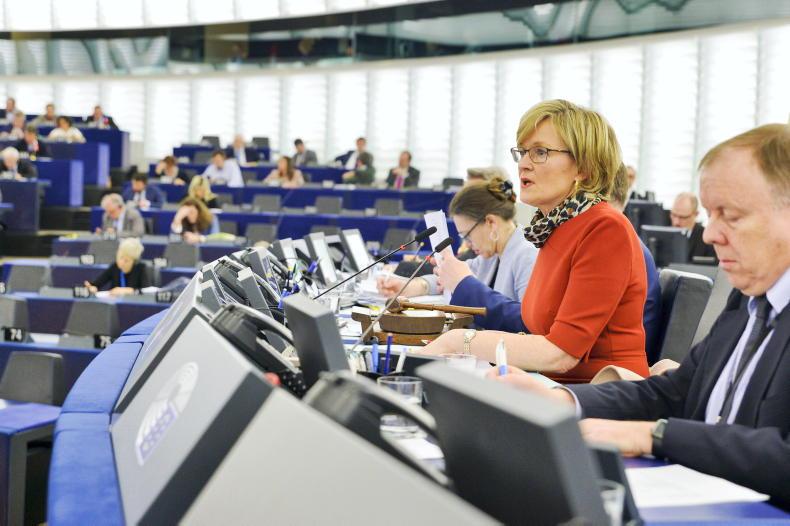






SHARING OPTIONS: